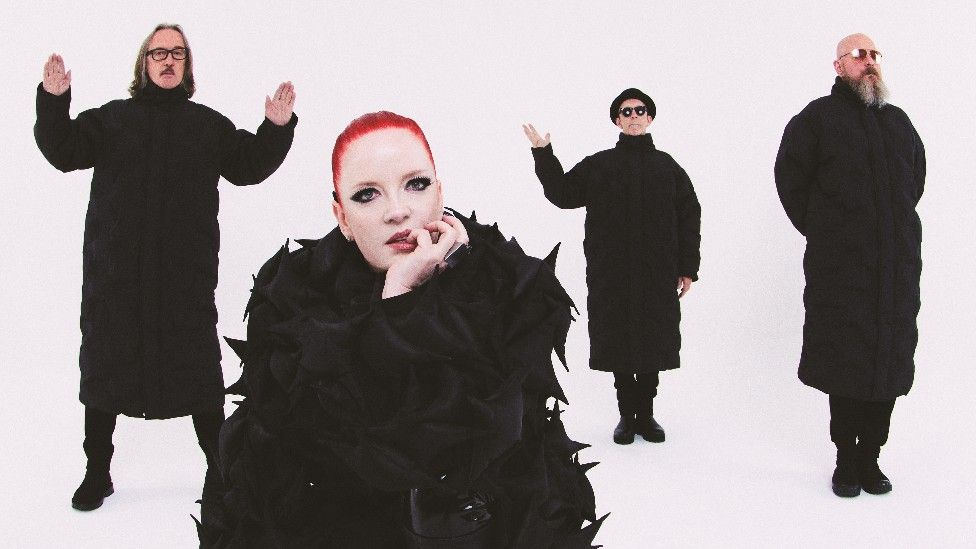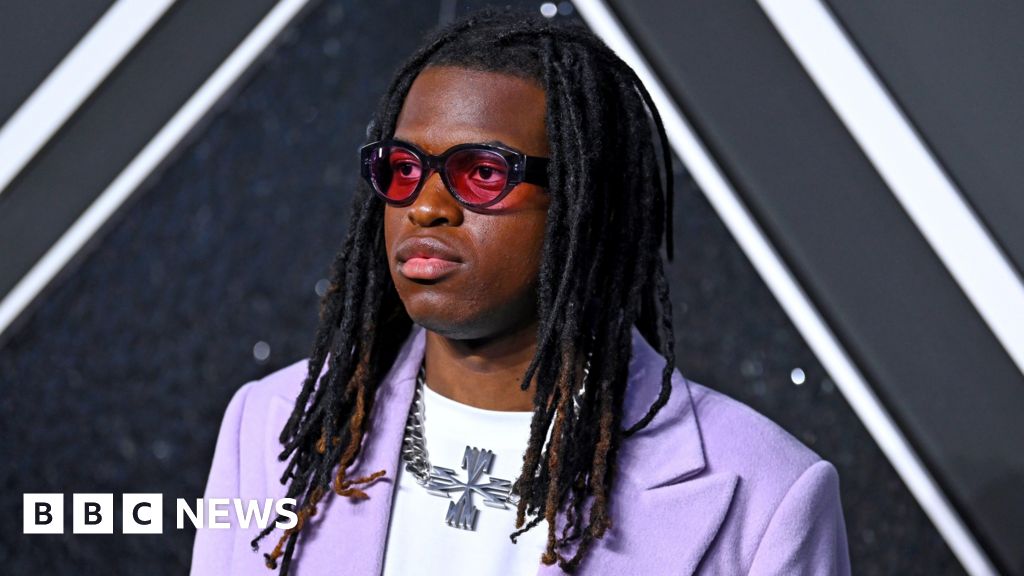ARTICLE AD BOX
 Image source, Brian Ziff
Image source, Brian Ziff
Garbage (L-R): Butch Vig, Shirley Manson, Duke Erikson and Steve Marker
By Mark Savage
BBC Music Correspondent
Nearly 30 years after Shirley Manson promised to "tear your little world apart", Garbage are still one of rock's most captivating and ferocious propositions.
The band emerged in 1995 with a blend of rock riffs, glitching electronics and seductive dance beats that shifted the sound of pop music.
But they were treated with suspicion by critics, who sniffed at their origins as a studio project - put together by Nirvana producer Butch Vig, who hired Manson despite a "disastrous" audition where nerves rendered her "practically mute".
"We were criticised for not being a real band," says Manson. "To this day, people dismiss us as a 'producer's band'. We've got it in the neck from everyone, no matter what we've done."
Even when they broke new ground by using samplers and loops in concert, it was dismissed as inauthentic.
"We were scoffed at, but now everybody's doing it," says the singer.
"We were the first band to put sonic shields up around the drum kit and people went nuts. You would have thought we killed their granny. And now everybody's doing that, too, because all the vocalists want a clean, pure signal."
Image source, Getty Images
Image caption,The band have several platinum albums, including their self-titled debut and 1998's Version 2.0
In spite (or maybe because of) their underdog status, the band survived - with last year's potent, political album No Gods, No Masters described as "terrifically thrilling" and "one of their best".
"We've somehow managed to build a career by refusing to listen to people," says Manson. "We have, in inverted commas, 'a bad attitude', but that attitude has allowed us to carve out a niche for ourselves."
To celebrate their third decade, the band have released a riotous, career-spanning Anthology album. Taking a cue from Manson's podcast The Jump - in which she interviews artists like Patti Smith and Alanis Morissette about writing their biggest hits - we asked her for the stories behind Garbage's greatest.
Vow (1995)
Warning: Third party content may contain adverts
"To be perfectly frank, I didn't really write the bulk of those lyrics. Vow was more or less written when I came to my audition but I loved the line, 'You burned me out but I'm back at your door / Like Joan of Arc coming back for more.' I was like, 'This is Patti Smith-level stuff'. She's one of my all time touchstones - and I think you can hear Patti's influence on every single record we've done - so I was well into it, and remain so.
"But Butch was really neurotic about Vow. He didn't think it was good enough. And in all fairness, he had more to lose than we did. I'd been in a couple of indie bands that nobody gave a stuff about, whereas Butch was a really well-known producer.
"Luckily for us, Volume magazine - which was at that time a very hip CD magazine - approached us while we were recording the debut album and said, 'We'd like to put out a Garbage track', and Vow was the only song that was really remotely close to being finished. And as a result of that magazine, Vow got played on radio and we took off."
Stupid Girl (1996)
Warning: Third party content may contain adverts
"People think it's our most successful song but it's far from it. I just think Stupid Girl was the moment everyone fell in love with us.
"It's very poppy, the production is unique and, of course, it's got that incredible Clash sample. Then Samuel Bayer made us a brilliant video (based on the title sequence to David Fincher's Se7en) and that's how a lot of people remember seeing us for the first time. And if I do say so myself, I looked extraordinary in that video. The band looked cool and it caught people's imagination.
"And who is the Stupid Girl? Well, there was a target but a lady never says!"
I Think I'm Paranoid (1998)
Warning: Third party content may contain adverts
A song about the music industry and the paranoia of following up a hit album. Manson says the lyrics are still relevant 24 years later.
"The music industry hasn't changed. Not really. Not the principles of it. It's an industry that's based around making money from needy creatives - and I think, as an artist, you do well to accept those parameters, because they do not change.
"That is the deal: Creative people need systems by which they can reach the population and the industry exploits that need. They make a lot of money and they are very careless with artists - who are the last people to get paid.
"We were lucky in that we emerged at a time before streaming when you could build a career. These days, alternative artists, who aren't making music to appeal to the mainstream, are getting drowned every single day."
The World Is Not Enough (1999)
Warning: Third party content may contain adverts
"David Arnold, who's the composer of the movie, asked to meet me in a coffee shop in London. He'd done this beautiful song, Play Dead, with Bjork and I was thrilled someone like him even wanted to meet me. Then over coffee he literally said, 'Do you want to sing the next Bond theme?'
"I, of course went mental and agreed immediately."
Androgyny (2001)
Warning: Third party content may contain adverts
"We had no idea that that we were tapping into something that would become common parlance, but I love the fact that we're all talking now about non-binary sexuality and gender. That excites me. I feel it's really important that we start to discipline ourselves to to think about [gender] differently and in a more nuanced, informed way.
"It's not about being attracted to people or sex. It's about being yourself, being a fulfilled happy person. And why some people feel the need to stamp on the necks of others because of some weird Victorian thinking is utterly beyond my understanding."
Why Do You Love Me (2005)
Warning: Third party content may contain adverts
"I have struggled with body dysmorphia and depression and self-harm in my life, and at times continue to, in varying degrees, and this song is definitely tackling those familiar feelings.
"I think it's important, as someone who's viewed as a well-known musician, to tell the truth about who I am - because it's so easy to look at so-called celebrities and only see the glamour.
"When we're in public, we get our hair and our make-up done and we get given incredible clothes by ridiculously talented designers. Then we wake up the next day and we're just normal people. The whole celebrity thing is an illusion. And it's an illusion that's fostered by a really greedy industry in order to make money.
"So I felt a responsibility as a musician to say, 'Hey, look, this is the truth of it.'"
The Men Who Rule The World (2021)
Warning: Third party content may contain adverts
Warning: Song contains an expletive.
"I want to finish up with The Men Who Ruled The World just because of the astounding prescience of that song. When you see what's happening in Iran or what the Republican party is is doing with women's rights in America, it's mind-boggling. If you think it's OK that a 10 year old should birth a child after being raped by a family member, I'm sorry, you've lost your moral compass.
"I'm proud of the song because it's not holding back any punches. When we first released it, a lot of male journalists were very rude about my so-called mental state. It was suggested that I take anti-depressants because of my mindset towards white male supremacy and, again, that underscores the crazy, unfettered male dominance in the world. It's terrifying.
"But don't get me wrong. I love men. I work with men, predominantly. This is not an anti-male stance. It's an anti-idiot stance."
Follow us on Facebook or on Twitter @BBCNewsEnts. If you have a story suggestion email entertainment.news@bbc.co.uk.

 2 years ago
29
2 years ago
29








 English (US)
English (US)